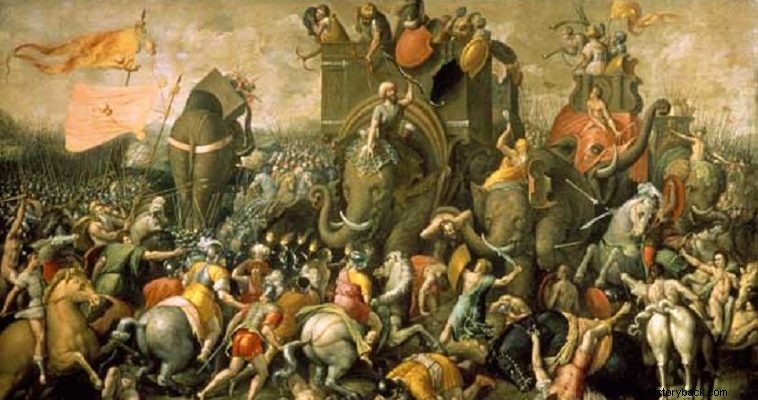
The campaign of the king of Epirus Pyrrhus in Sicily, in the middle of his campaign in Italy, is one of the most unknown aspects of the venture. His goal was to save the Greek cities from the Carthaginians and their Mamertine allies. The latter were former mercenaries who had settled in Sicily and formed a kind of state. At the end of May 278 BC. Pyrrhus set sail from the Italian coast with 8,000 of his men and his war elephants. Despite the surveillance of the Sicilian coast by the powerful Carthaginian fleet, Pyrrhus managed to land his small force at the port of Tauromenium, at the entrance to the Sicilian strait.
There he was welcomed by the tyrant of Tyndarian City, who also provided him with the small forces he had. Thus strengthened, Pyrrhus set out for Catania. In the meantime the news of Pyrrhus' arrival in Sicily caused excitement among the Greeks and terror among the Carthaginians and Mamertines. Indeed, as soon as Pyrrhus moved towards Syracuse the Carthaginian tremolos lifted the siege of the city – although they had 50,000 men and 120 warships. Pyrrhus entered Syracuse victorious without having to fight. With his prestige he managed to unite the warring sections of the city and direct them to the common struggle against the barbarians. Grateful, the Syracusans provided Pyrrhus with 10,000 soldiers and 140 warships.
Soon, other city rulers began to arrive in the city, bringing military reinforcements. One of them, the tyrant of the city of Leontia, Heraclides, placed himself and 4,500 infantry and cavalry at the disposal of Pyrrhus, who was also proclaimed "Sicilian Ruler and King". The following spring, having gathered some 25,000 soldiers and a fleet of 200 warships, Pyrrhus continued his campaign into the interior of the island. With a rapid advance he surprised the Carthaginians and captured, without a fight, the cities of Enna and Akraganta. Akragantes' army – 8,000 infantry and 800 cavalry – joined him. Continuing his triumphant march, he became master of the cities of Heraklia, Selinountos, Alaisa and Egesta. The Carthaginians decided to resist the heavily fortified city of Erica. But they were soon swept away by the lightning attack of Pyrrhus' men, who were led by him.
He was the first to climb the enemy wall and enter the city. The sweeping march of Pyrrhus had terrified the warriors. The Carthaginians, masters of the island a few months before, were now confined to the possession of Lilyvaeum, the impregnable fortress at the south-western extremity of Sicily. However, Pyrrhus failed against the strong fortifications of Lilyvaion. The fort remained impregnable, being a Carthaginian bridgehead in Sicily.
In the meantime, Pyrrhus also attacked the Mamertine bandits, whom he also defeated and confined to the walls of Messina. However, Pyrrhus had not given up on the goal of expelling the Carthaginians from Sicily. He even conceived the daring plan of transferring the war to Africa. In his plan, however, he faced the reaction of the Greeks of Sicily. There were even fratricidal conflicts. Disgusted by the behavior of the Greeks, Pyrrhus decided to leave the island and return to Italy, where his allies Tarantinos and Sainites were under suffocating pressure from the Romans.
However, while sailing towards Italy, his fleet was attacked by the Carthaginian and suffered a real crash. The remains of the fleet landed the remains of the army in Italy. And there, however, a new unpleasant surprise awaited Pyrrhus. More than 10,000 Mamertines had also crossed into Italy and ambushed Pyrrhus' overworked army, seeking revenge on him for the blows he had dealt them. With surprise attacks, the Mamertines overwhelmed the Greeks.
In one of them they even managed to kill several men and two elephants. When Pyrrhus rushed to rescue his men, he was attacked by a giant Mamertine. The Italian managed to stab Pyrrhus in the helmet with his sword. The helmet disintegrated and Pyrrhus was wounded. Terror gripped his men who saw their king with his face full of blood. They immediately pulled him out of the battle and washed his wound. The Mamertines meanwhile were excited. Believing that Pyrrhus was dead.
The giant Mamertinos then came out in front of the yokes and boldly shouted to Pyrrhus:"If you live and are not afraid, come." As soon as Pyrrhus heard these words, he was automatically cured. With blood running down his face, with only his sword tightly held in his hand, Pyrrhus, rushed forward. Running he charged furiously at his bewildered opponent and dealt him such a blow with his sword that his huge body was almost cut in two.
The barbaric giant collapsed and his lifeless carcass tumbled to the ground in a thud. The blow of Pyrrhus was so strong that even his strong armor could not withstand it. After this episode the Mamertines did not dare to disturb the Greek army again. Finally, after much toil, the army reached Taranto. Almost three years had passed since his departure for Sicily.
